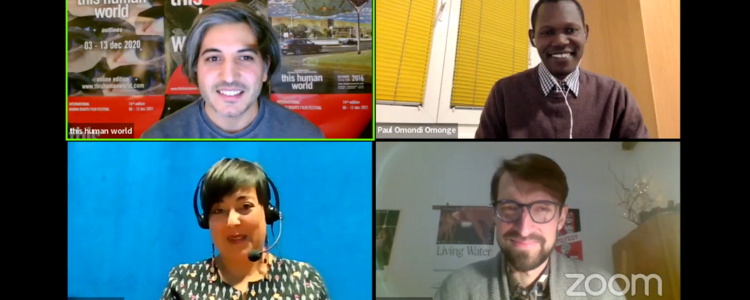This year the film Living Water was shown followed by a discussion with film director and social anthropologist Pavel Borecký and Paul Omondi Omonge, PhD Candidate at the Institute of Hydrology and Water Management (BOKU) Vienna and APPEAR scholarship holder within the CapNex Project.
Living Water takes a calm but deep look at an essential and global problem: the economization of the precious resource water in Wadi Rum, the "Valley of the Moon" in Jordan, a desert landscape known as a location for Hollywood films and adventurous tourist attractions. The economic, political and cultural conflicts over the last abundant source of drinking water in the region become visible in the film. Pollution and scarcity are further consequences of exploitation, as is man-made global warming.
Paul and Pavel, though coming from different disciplines, have a lot in common and it was an informing and inspiring discussion. Both are academics and researchers with a background in international development and water is in the center of their interest. Their transdisciplinary approaches include intersections related to water as a valuable resource for mankind and social, economic and environmental issues. Pavel’s long-term field work culminating in this film shows the interrelations of different challenges related to water scarcity, also as a global example: “Conflicting water demands, transboundary water resources, how to harmonize these are exactly the connecting points or main themes in my film. The water resources are in the south of Jordan. What are we going to find there? Which communities use water? I'm trying to create a categorization. I'm a little bit trying to generalize. It's not about a single hero, maybe the water itself is a single hero here we all need to take care of. That's one of the messages of the film.
Paul Omondi Omonge’s research interest such as forecasting water availability and use water-energy and food security nexus, like in the APPEAR Project CapNEX where he was involved go beyond collecting data. He has a holistic view of these problems such as climate change or the inclusion of local and indigenous knowledge into science: “What I have come to realize is that the indigenous communities have a certain knowledge that many have ignored, and it is really critical in the conservation of water resources. For example, I have interacted with people who can tell you that the presence or absence of a certain tree or plant or bird is enough indication that either the wetland is not healthy, or the river water is not clean. Or there's not or there’s not enough water anymore.”
The discussion took us to questions on essential global challenges reflected through common grounds and intersections. If you like to know more about the topic and the transdisciplinary work of science and film or the importance of other ways of knowing, of knowledge and of information listen and watch here
